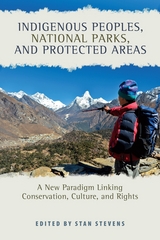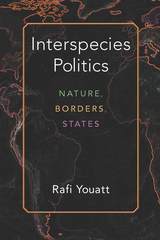4 start with I start with I

Indigenous Peoples, National Parks, and Protected Areas integrates wide-ranging, multidisciplinary intellectual perspectives with detailed analyses of new kinds of protected areas in diverse parts of the world. Eleven geographers and anthropologists contribute nine substantive fieldwork-based case studies. Their contributions offer insights into experience with new conservation approaches in an array of countries, including Australia, Canada, Guatemala, Honduras, Nepal, Nicaragua, Peru, South Africa, and the United States.
This book breaks new ground with its in-depth exploration of changes in conservation policies and practices—and their profound ramifications for Indigenous peoples, protected areas, and social reconciliation.


This book explores the ways that international politics is a form of interspecies politics, one that involves the interactions, ideas, and practices of multiple species, both human and nonhuman, to generate differences and create commonalities. While we frequently think of having an international politics “of” the environment, a deep and thoroughgoing anthropocentrism guides our idea of what political life can be, which prevents us from thinking about a politics “with” the environment. This anthropocentric assumption about politics drives both ecological degradation and deep forms of interhuman injustice and hierarchy.
Interspecies Politics challenges that assumption, arguing that a truly ecological account of interstate life requires us to think about politics as an activity that crosses species lines. It therefore explores a postanthropocentric account of international politics, focusing on a series of cases and interspecies practices in the American borderlands, ranging from the US-Mexico border in southern Texas, to Guantánamo Bay in Cuba, to Isle Royale, near the US-Canadian border. The book draws on international relations, environmental political theory, anthropology, and animal studies, to show how key international dimensions of states—sovereignty, territory, security, rights—are better understood as forms of interspecies assemblage that both generate new forms of multispecies inclusion, and structure forms of violence and hierarchy against human and nonhuman alike.

“The greenhouse effect is us, and it is specifically us in the Western world.” This is one of the messages at the beginning of Anita Gordon and David Suzuki’s startling view of our future on Earth. More than any other time in history, the 1990s have marked a turning point for human civilization. Not only are we facing ecological disasters that will affect our ability to survive, but the crisis is forcing us to reexamine the entire value system that has governed our lives for the past two thousand years.
Gordon and Suzuki warn us of the transition we will need to make if we are to arrive safely in the next century. More than a book on the environment, this is a book about us as a species: our shortsightedness, our failure to read the warnings, our inability to grasp the significance of our actions-and the tough decisions we have to make in order to save ourselves.
The power of the book lies in the consensus of the many voices, those of scientists and other scholars, that speak through it. The components of our predicament—global warming, soil erosion, acid rain, species depletion, ozone damage, rainforest destruction, overpopulation—are quantified with authority. And never before has such a strong consensus been expressed in a single warning. The message we receive is that our actions are taking place in a political and economic world that demands radical change.
In an effort to counteract this blueprint for disaster, Gordon and Suzuki present a resounding rebuttal of technological optimism and the belief that continued economic growth is a prerequisite for environmental reform. The intellectual fog of sustainable development is incisively dispelled, and in its place the authors suggest practical contributions that individuals as well as governments can make toward creating a “conserver society.”
READERS
Browse our collection.
PUBLISHERS
See BiblioVault's publisher services.
STUDENT SERVICES
Files for college accessibility offices.
UChicago Accessibility Resources
home | accessibility | search | about | contact us
BiblioVault ® 2001 - 2024
The University of Chicago Press









